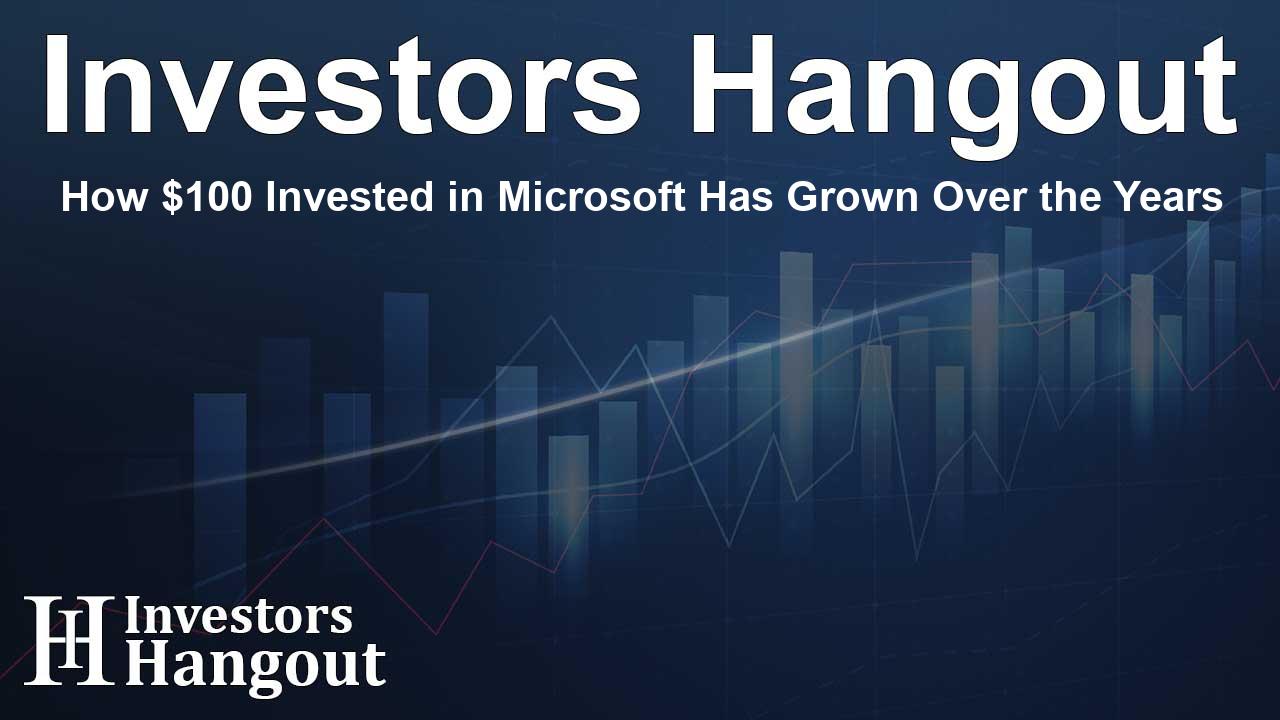How $100 Invested in Microsoft Has Grown Over the Years

Understanding Microsoft’s Impressive Growth
Microsoft (NASDAQ: MSFT) has consistently outperformed the broader market over the past five years, showcasing an annualized return that exceeds the average by 4.85%. This impressive performance has led to an average annual return of 19.04%, underscoring Microsoft’s robust market strategies and product innovations.
Investment Insights: The Value of Long-Term Holding
For investors contemplating the growth of Microsoft, a $100 investment in MSFT stock five years ago would now be valued at approximately $240.49, assuming the current price of $516.94. This noteworthy increase exemplifies the power of holding quality stocks over an extended period and capitalizing on compounding returns.
A Closer Look at Microsoft’s Market Capitalization
Currently, Microsoft's market capitalization stands at an astounding $3.84 trillion. This figure places Microsoft among the top companies globally, reflecting its expansive reach and influence in various technological sectors. The company's ability to innovate continually ensures it maintains a competitive edge.
The Importance of Compounded Returns
The key takeaway from analyzing Microsoft's stock performance is the significant impact compounded returns can have on investment growth. When investments are held over time, the earnings generated can produce additional earnings, leading to exponential growth.
Microsoft's Forward-Looking Perspective
As Microsoft continues to evolve, it remains committed to setting industry standards in technology and cloud services. With ongoing investments in artificial intelligence and collaborative tools, the company is well-positioned for sustained growth in the coming years.
Understanding Market Trends and Future Performance
Investors looking at Microsoft should also consider broader market trends. Microsoft's diverse portfolio, including cloud computing and productivity software, allows it to navigate economic changes effectively. The company's agility ensures that it can adapt to market needs, maximizing shareholder value.
Frequently Asked Questions
How did Microsoft outperform the market?
Microsoft achieved significant growth due to strategic innovations and a focus on expanding its cloud services, yielding higher returns than the average market performance.
What is the current market capitalization of Microsoft?
As of now, Microsoft has a market capitalization of around $3.84 trillion, making it one of the largest companies globally.
How much would $100 invested in Microsoft be worth today?
A $100 investment in Microsoft made five years ago is now worth approximately $240.49.
Why are compounded returns important for investors?
Compounded returns enhance investment growth by earning returns on the original investment as well as on the accumulated earnings over time.
What sectors is Microsoft focusing on for future growth?
Microsoft is heavily investing in cloud computing and artificial intelligence, which are expected to drive future growth and enhance its market position.
About The Author
Contact Riley Hayes privately here. Or send an email with ATTN: Riley Hayes as the subject to contact@investorshangout.com.
About Investors Hangout
Investors Hangout is a leading online stock forum for financial discussion and learning, offering a wide range of free tools and resources. It draws in traders of all levels, who exchange market knowledge, investigate trading tactics, and keep an eye on industry developments in real time. Featuring financial articles, stock message boards, quotes, charts, company profiles, and live news updates. Through cooperative learning and a wealth of informational resources, it helps users from novices creating their first portfolios to experts honing their techniques. Join Investors Hangout today: https://investorshangout.com/
The content of this article is based on factual, publicly available information and does not represent legal, financial, or investment advice. Investors Hangout does not offer financial advice, and the author is not a licensed financial advisor. Consult a qualified advisor before making any financial or investment decisions based on this article. This article should not be considered advice to purchase, sell, or hold any securities or other investments. If any of the material provided here is inaccurate, please contact us for corrections.
